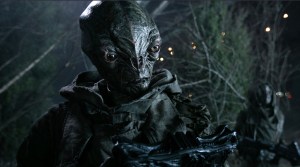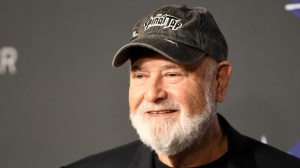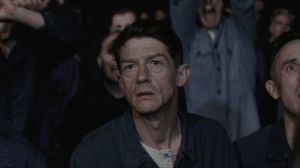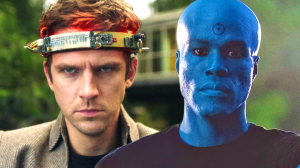Frank Herbert’s Dune has a long legacy of filmmakers attempting to do justice to his novel. Whether it be a failed take on the material from Alejandro Jodorowsky in the ’70s, David Lynch in a 1984 film, or a 2003 miniseries, no one could quite crack the code to make a definitive translation of the material to balance the dense and layered themes Herbert delivered while also making for an accessible and easily digestible experience. Denis Villeneuve largely accomplished the impossible with his 2021 Dune, as he avoided the standard tropes of the sci-fi genre and honored the complexity of the source material, to the point of splitting the narrative into two films. With Dune: Part Two, Villeneuve continues to circumvent expectations and, while there was the opportunity to offer up more bombast than the debut film, instead focuses on the tragic elements of Paul Atreides, serving instead as a cautionary tale of anyone deeming themselves to be a messiah.
Videos by ComicBook.com
Picking off almost immediately after the events of Dune, Paul (Timothée Chalamet) and his mother Lady Jessica (Rebecca Ferguson) have collided with a group of Fremen, led by Stilgar (Javier Bardem), after the Harkonnen have attacked and seemingly eradicated all of House Atreides. Paul and Jessica are both integrated into the Fremen community, based on prophecies and visions the Arrakis natives have, all while Paul and Chani (Zendaya) grow closer to one another, despite Chani’s apprehension about Paul’s furthering beliefs that he could be a messiah that will bring peace to the universe as the Fremen’s “Muad’Dib.”
Elsewhere in the universe, Baron Harkonnen (Stellan Skarsgård) aims to extend his power, enlisting his nephew Feyd-Rautha Harkonnen (Austin Butler) to call the shots on Arrakis. However, reports of the rebellious Muad’Dib have reached Emperor Shaddam IV (Christopher Walken) and his daughter Princess Irulan (Florence Pugh), as they grow nervous of what this figure could mean for the empire.
With his first Dune, Villeneuve offered a much more ethereal take on the worlds of Herbert’s novel than seen in previous takes on the material, which allowed him to further establish himself as a visionary in the sci-fi realm in the wake of projects like Arrival and Blade Runner 2049. Part Two is just as gorgeous and captivating as the debut film, though what holds it back in the realm of spectacle is that audiences are continuing to spend time on worlds we’ve already been introduced to, so there isn’t much that takes us by surprise. While sequences of Paul taming the sandworms, known as Shai-Hulud, or attacks on spice miners are intense and adrenaline-pumping, they don’t entirely surpass what the filmmaker accomplished in the debut film. The exception to this in Part Two, though, are the sequences on the Harkonnen homeworld of Giedi Prime, which are filmed in a contrasting monochrome that makes for a striking gladiatorial scene that showcases the ruthlessness of Feyd-Rautha. Additionally, while a siege sequence in the final act of the film would have likely been expanded to create epic scenes of intergalactic combat under the direction of other filmmakers, Villeneuve keeps this sequence efficient and restrained, never showcasing warfare just for the sake of injecting action.
While the visuals of the film might not surpass the accomplishments of the first, the character development of figures both new and old are far more rich. Many audiences who were unaware of Chani’s role in the story were disappointed she earned so little screentime in the first Dune will be delighted to see her become arguably the most important character in Part Two‘s story. Zendaya continues to showcase why she’s one of the most in-demand performers of her generation, while Chalamet delivers equal parts charm, vulnerability, and megalomania as Paul. Ferguson is also a standout in the picture, as she weaves an intricate tapestry of a figure who cares for her child yet always has the goals of the Bene Gesserit (a witch-like group who aims to control the events of the universe) in mind. Skarsgård is just as detestable as he was in the first film, but it’s his on-screen nephew that will both excite and frighten viewers, as Butler has entirely disappeared into the treacherous role of Feyd-Rautha. Only a year after viewers witnessed his career-defining performance in Elvis, Butler is entirely unrecognizable as the warrior, making for a stark contrast to how Pugh brings the worrying Irulan to life, as she seems to be the only one who puts the fate of the universe ahead of her own wants and desires.
Where Villeneuve and his cowriter Jon Spaihts must really be commended is how, despite Paul being known as an iconic sci-fi hero, the pair make it quite clear that he’s not necessarily a character to envy. He’s undeniably powerful, charismatic, and driven by revenge against those who killed his father, but he also buys too much into what he’s being fed by his sycophants, whether they be the Fremen or his mother. Paul will stop at nothing to achieve his goals and this film proves that absolute power corrupts absolutely, and it’s up to the viewer to determine whether the ends justify the means.
Speaking of endings, Villeneuve has already expressed how he aims to also adapt Herbert’s next novel in the series, Dune Messiah, into a film, though it has yet to be officially greenlit by Warner Bros. The ending of Dune: Part Two might not feel quite like the implied “To be continued…” that the first film ended on, so this resolution is a bit more satisfying than its predecessor, but the implications of the final act of the film are sure to frustrate viewers. For better or worse, there’s even a piece of dialogue that harkens back to Aragorn’s line, “Let’s hunt some Orc,” in the final scenes of The Lord of the Rings: The Fellowship of the Ring, but knowing that the Tolkien film had a sequel on the way, audiences accepted it a bit more easily. While it seems likely that Villeneuve will get to make Messiah in the relatively near future, the nature of the source material and the director’s authentic adaptation of it means we can’t count on getting that entirely satisfying ending quite yet.
Herbert’s Dune is not only a thrilling journey in its own right, but it also serves as an allegory exploring themes of colonialism, fanaticism, religion, imperialism, and the exploitation of natural resources. These aren’t entirely crowd-pleasing ideas, and Villeneuve largely accomplishes honoring those themes while also making for an engaging sci-fi epic. It doesn’t quite feel as awe-inspiring as the debut film, but this will ultimately work in the favor of the story, as we aren’t given arbitrarily inflated elements that would have fit within the blockbuster-oriented sensibilities of franchise filmmaking seen in so many other series. Still, the fact that such an inaccessible tome could be brought to life without having to sacrifice either the character complexities or depressing allegories found within the source material makes the two-film journey a triumph in its own right, and we can’t wait to see where Messiah will take us.
Rating: 4 out of 5
Dune: Part Two lands in theaters on March 1st.








